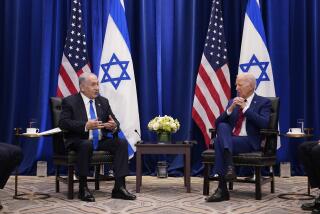Shultz Trying for Fresh Look at Mideast Peace Process
- Share via
JERUSALEM — Secretary of State George P. Shultz held separate meetings, nearly equal in length, with Israel’s competing political leaders Friday at the start of an American effort to revive the Middle East peace process.
He has admitted, however, that his efforts amount to little more than “rearranging the furniture” to make old plans look fresh.
Shultz met for about 80 minutes with Prime Minister Yitzhak Shamir--50 minutes of that with only the two men in the room--then held a similar session of about an hour with Foreign Minister Shimon Peres, 40 minutes of that in one-on-one talks.
State Department spokesman Charles Redman said the agendas at both meetings were similar, touching on Soviet Jewish emigration while aides were present and turning primarily to the Arab-Israeli peace process during the private talks.
Power Shared
Shamir and Peres share power in Israel’s “national unity” government, but they are bitter political rivals with starkly different approaches to efforts to make peace with Israel’s Arab neighbors.
Peres, head of the centrist Labor Alignment, advocates an international conference to serve as a backdrop for direct negotiations between Israel and Jordan. Shamir, leader of the rightist Likud Bloc, opposes the conference, in part because it would give the Soviet Union a larger role in the region, but primarily because he fears that such a meeting would pressure Israel to return part of the occupied West Bank of the Jordan River and Gaza Strip to Arab sovereignty.
The format of the meetings seemed to cast Shultz in the awkward position of acting as mediator between the top officials of another government. But Shultz, whose own stated position on an international conference is much closer to Peres’ stand than it is to Shamir’s, said he had no intention of trying to pressure the prime minister into changing his policy.
‘Same Pictures, More Appeal’
Asked during the 12-hour flight from Washington if he was bringing new ideas, Shultz said he hoped to get all the parties thinking afresh about existing plans, a process he said was much like refurbishing a room by “rearranging the furniture” without buying anything new.
“Sometimes if you rearrange it, put the same pictures on different walls, it looks different and has more appeal,” he said.
Shultz was asked what he planned to do to persuade Shamir to endorse the “territory-for-peace” formula which calls for Israel to withdraw from territory that it captured during the Six-Day War of 1967 in exchange for a peace treaty with its Arab adversaries guaranteeing Israel’s right to exist within internationally recognized borders.
The United States supports such an approach, but Shamir’s Likud Bloc maintains that Israel will not yield any more territory after returning the Sinai Peninsula to Egypt in 1982.
In his response, Shultz expressed sympathy for Shamir’s frequently repeated concern about Israeli security.
‘Very Small Country’
“I don’t have the slightest doubt in my mind that Prime Minister Shamir wants peace just as much as anybody else does,” Shultz said. “If you are a very small country in an area that is hostile to you, you have to be careful . . . and now allow your desire (for peace) to overtake your common sense.
“On the other hand, you have to find out if you can devise commonsensical ways to get to that objective . . . because if you never do, that, too, carries tremendous risks and he (Shamir) understands that very well,” Shultz added.
He said he approached the talks “in a creative frame of mind.” He said he expected the Israeli side to show equal creativity.
On one issue, Shamir and Peres expressed identical views, but Shultz disagreed with both of them. The Israeli leaders called for the United States to deny refugee status to Soviet Jews allowed to leave the Soviet Union so they would have no alternative to settling in Israel. Redman said Shultz replied that the United States believes that the emigres should have “freedom of choice” which would allow them to live in the United States, Israel or any other country.
Shultz is scheduled to meet again separately with Shamir and Peres tonight after the Jewish Sabbath ends at sundown. Earlier in the day, he has scheduled a round-trip flight to Jidda to have lunch with Saudi Arabia’s King Fahd. His 4 1/2-hour stay in Saudi Arabia, contrasted with three days in Israel, has produced some bitter feelings among Arab leaders.
More to Read
Sign up for Essential California
The most important California stories and recommendations in your inbox every morning.
You may occasionally receive promotional content from the Los Angeles Times.










